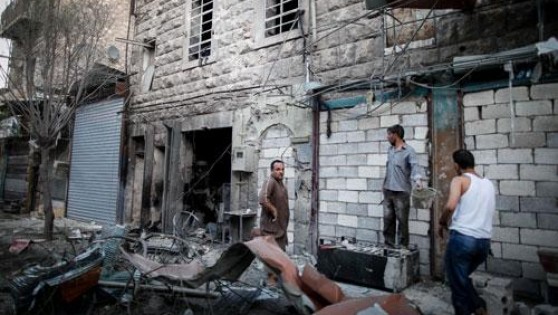 Destroyed Storefront in AleppoGhaith Abdul-Ahad writes for The Guardian:
Destroyed Storefront in AleppoGhaith Abdul-Ahad writes for The Guardian:
It wasn't the government that killed the Syrian rebel commander Abu Jameel. It was the fight for his loot. The motive for his murder lay in a great warehouse in Aleppo which his unit had captured a week before. The building had been full of rolled steel, which was seized by the fighters as spoils of war.
But squabbling developed over who would take the greater share of the loot and a feud developed between commanders. Threats and counter-threats ensued over the following days.
Abu Jameel survived one assassination attempt when his car was fired on. A few days later his enemies attacked again, and this time they were successful. His bullet-riddled body was found, handcuffed, in an alley in the town of al-Bab.
Captain Hussam, of the Aleppo military council, said: "If he had died fighting I would say it was fine, he was a rebel and a mujahid and this is what he had set out to do. But to be killed because of a feud over loot is a disaster for the revolution.
"It is extremely sad. There is not one government institution or warehouse left standing in Aleppo. Everything has been looted. Everything is gone."
Captured government vehicles and weapons have been crucial to the rebels since the start of the conflict, but according to Hussam and other commanders, and fighters interviewed by the Guardian over a fortnight in northern Syria, a new phase has been reached in the war. Looting has become a way of life.
"Spoils" have now become the main drive for many units as battalion commanders seek to increase their power.
The problem is particularly pronounced in Aleppo, according to Abu Ismael, a young lieutenant from a wealthy family, who ran a successful business before joining the fight against Bashar al-Assad.
Many of the battalions that entered the city in the summer of this year came from the countryside, he said. They were poor peasants who carried with them centuries-old grudges towards the wealthier Aleppans.
There was also a lingering feeling that the city --- where businesses had been exploiting cheap peasant labour for several decades --- had not risen up quickly enough against the Assads. "The rebels wanted to take revenge on the people of Aleppo because they felt that we had betrayed them, but they forgot that most of the people of Aleppo are merchants and traders and a merchant will pay money to get rid of his problem," Abu Ismael said. "Even as the rest of Syria was gripped by revolution, the Aleppans said, why should we destroy our business and waste our money?"
When the rebels entered the city and started looting the factories, a source of money dried up.
"In the first month and a half the rebels were really a united revolutionary group," Abu Ismael said. "But now they are different. There are those who are here only to loot and make money, and some still fight." Did Abu Ismael's unit loot? "Of course. How do you think we feed the men? Where do you think we get all our sugar, for example?"
In the chaotic economics of the war, everything has become a commodity. Abu Ismael's unit, for example, took a supply of diesel from a school compound, and every day his unit exchanges a few jerrycans of the precious liquid for bread.
Because Abu Ismael has a supply of food and fuel, his battalion is more desirable than others in the sector. Commanders who are unable to feed their men tend to lose them; they desert and join other groups.
Bullets are equally important. When military installations and warehouses are looted the battalion that captures ammunition grows by cannibalising smaller, less well-equipped units that have no bullets to hand.
In a dark apartment in the Salahuddin neighbourhood of Aleppo we sat with a group of commanders who were discussing the formation of a new brigade that would bring their various battalions together. They soon turned to the topic of loot.
One of the commanders present had led an operation into the predominantly Kurdish neighbourhood of Ashrafiya in Aleppo, but according to several fighters who were there the action failed when the army counterattacked because the rebel support units that were supposed to reinforce the front instead turned their attention to looting.
"I want to know exactly what you took that day," the commander of a small unit told the leader of the assault. The commander opened a notebook to write, while another man held a flashlight above his head. "As long as one fights while the others are busy collecting loot we can't advance," he said. "The loot has to be divided equally."
The leader started to list the luxury cars and the weapons his units had found and taken, while the other commander wrote them down in the notebook. Some of the cars would be sold back to the owners --- if they paid out a hefty ransom.
The war in Aleppo is not only funded by what can be appropriated by the various units, but also by the patronage that they can attract from sponsors outside Syria, a factor which has also contributed to the myriad forming and re-forming of units, all of which control individual fiefdoms in the city.
All of this has fuelled rivalries and ever-shifting allegiances, factors that have undermined the struggle to defeat the forces of the Syrian president.